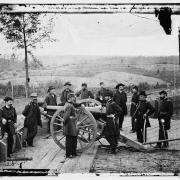151 Years Ago: Sherman Defends Forced Evacuation of Atlanta
After the siege of and battle for Atlanta, Gen. William T. Sherman ordered the evacuation of all remaining civilians from the city (September 1864). Mayor James Calhoun and two city councilmen urged the Union general to rescind the forced evacuation. Some residents were sick, poor, pregnant, the city fathers said, and the South was already overcrowded as it was, resulting in homelessness for those without family to take them in. Sherman’s response to the men was widely published by newspapers both North and South, and passages from it came to be recognized as readily as the Gettysburg Address. Some historians call his letter, below, the greatest explanation for the causes and consequences of civil war ever written. In 1864, it heartened the North for the fighting ahead. But to Calhoun, who had been against secession himself but determined to protect Atlanta while his own son fought for the Confederacy, Sherman’s words sliced like a dagger to the heart. William T. Sherman Headquarters Military Division of the Mississippi, in the Field, Atlanta, Georgia September 12, 1864 JAMES M. CALHOUN, Mayor, E. E. RAWSON and S. C. WELLS, representing City Council of Atlanta. Gentlemen: I have your letter of the 11th, in the nature of a petition to revoke my orders removing all the inhabitants from Atlanta. I have read it carefully, and give full credit to your statements of the distress that will be occasioned, and yet shall not revoke my orders, because they were not designed to meet the humanities of the case, but to prepare for the future struggles in which millions of good people outside of Atlanta have a deep interest. We must have Peace, not only at Atlanta, but in all America. To secure this, we must stop the war that now desolates our once happy and favored country. To stop war, we must defeat the Rebel armies which are arrayed against the laws and Constitution that all must respect and obey. To defeat those armies, we must prepare the way to reach them in their recesses, provided with the arms and instruments which enable us to accomplish our purpose.
[[{"type":"media", "view_mode":"media_large", "fid":"1008", "attributes":{"class":"media-image wp-image-1960 size-full", "typeof":"foaf:Image", "style":"", "width":"535", "height":"640", "alt":"cityhall2"}}]] 2nd Massachusetts Infantry camped on Atlanta City Hall parade grounds. The bricks and wood were taken from rubble and fences.
Now, I know the vindictive nature of our enemy, that we may have many years of military operations from this quarter; and, therefore, deem it wise and prudent to prepare in time. The use of Atlanta for warlike purposes is inconsistent with its character as a home for families. There will be no manufactures, commerce, or agriculture here, for the maintenance of families, and sooner or later want will compel the inhabitants to go. Why not go now, when all the arrangements are completed for the transfer, instead of waiting till the plunging shot of contending armies will renew the scenes of the past month? Of course, I do not apprehend any such thing at this moment, but you do not suppose this army will be here until the war is over. I cannot discuss this subject with you fairly, because I cannot impart to you what we propose to do, but I assert that our military plans make it necessary for the inhabitants to go away, and I can only renew my offer of services to make their exodus in any direction as easy and comfortable as possible. You cannot qualify war in harsher terms than I will.
[[{"type":"media", "view_mode":"media_large", "fid":"1009", "attributes":{"class":"media-image wp-image-1961 size-full", "typeof":"foaf:Image", "style":"", "width":"610", "height":"640", "alt":"ShermansMen"}}]] Sherman's men destroying railroad.
War is cruelty, and you cannot refine it; and those who brought war into our country deserve all the curses and maledictions a people can pour out. [Tweet ""War is cruelty and you cannot refine it." #YankeeinAtlanta"] I know I had no hand in making this war, and I know I will make more sacrifices to-day than any of you to secure peace. But you cannot have peace and a division of our country. If the United States submits to a division now, it will not stop, but will go on until we reap the fate of Mexico, which is eternal, war. The United States does and must assert its authority, wherever it once had power; for, if it relaxes one bit to pressure, it is gone, and I believe that such is the national feeling. This feeling assumes various shapes, but always comes back to that of Union. Once admit the Union, once more acknowledge the authority of the national Government, and, instead of devoting your houses and streets and roads to the dread uses of war, I and this army become at once your protectors and supporters, shielding you from danger, let it come from what quarter it may. I know that a few individuals cannot resist a torrent of error and passion, such as swept the South into rebellion, but you can point out, so that we may know those who desire a government, and those who insist on war and its desolation. [Tweet ""You might as well appeal against the thunder-storm as against these terrible hardships of war." #YankeeinAtlanta"] You might as well appeal against the thunder-storm as against these terrible hardships of war. They are inevitable, and the only way the people of Atlanta can hope once more to live in peace and quiet at home, is to stop the war, which can only be done by admitting that it began in error and is perpetuated in pride. We don’t want your negroes, or your horses, or your houses, or your lands, or anything you have, but we do want and will have a just obedience to the laws of the United States. That we will have, and, if it involves the destruction of your improvements, we cannot help it. . . I want peace, and believe it can only be reached through Union and war, and I will ever conduct war purely with a view to perfect and early success. But, my dear sirs, when peace does come, you may call on me for anything. Then will I share with you the last cracker, and watch with you to shield your homes and families against danger from every quarter. Now you must go, and take with you the old and feeble; feed and nurse them, and build for them, in more quiet places, proper habitations to shield them against the weather, until the mad passions of men cool down, and allow the Union and peace once more to settle over your old homes at Atlanta. Yours in haste, W. T. Sherman, Major-General commanding. So there you have it. *All photos courtesy of the Library of Congress. You may also be interested in:
Yankee in Atlanta (Heroines Behind the Lines Civil War Book 3)
[[{"type":"media", "view_mode":"media_large", "fid":"1010", "attributes":{"class":"media-image alignleft size-full wp-image-1775", "typeof":"foaf:Image", "style":"", "width":"125", "height":"194", "alt":"Yankee 125"}}]]412 pages, softcover* 4.5 Stars from RT Book Reviews! She hid from her past to find a future—and landed on enemy soil. When soldier Caitlin McKae wakes up in Atlanta, the Georgian doctor who treats her believes Caitlin’s only secret is that she had been fighting for the South disguised as a man. In order to avoid arrest or worse, Caitlin hides her true identity and makes a new life for herself in Atlanta as a governess for the daughter of Noah Becker—on the brink of his enlistment with the Rebel army. Though starvation rules, and Sherman rages, she will not run again. In a land shattered by strife and suffering, a Union veteran and a Rebel soldier test the limits of loyalty and discover the courage to survive. [[{"type":"media", "view_mode":"media_large", "fid":"1011", "attributes":{"class":"media-image alignnone wp-image-3417 size-full", "typeof":"foaf:Image", "style":"", "width":"200", "height":"51", "alt":"deepershoppingbutton"}}]] [[{"type":"media", "view_mode":"media_large", "fid":"1012", "attributes":{"class":"media-image alignnone wp-image-2768 size-full", "typeof":"foaf:Image", "style":"", "width":"134", "height":"45", "alt":"add-to-goodreads-button"}}]]


